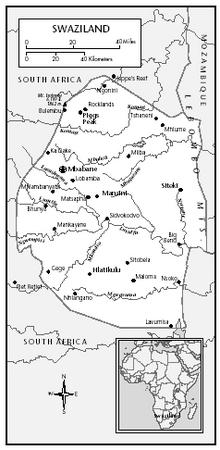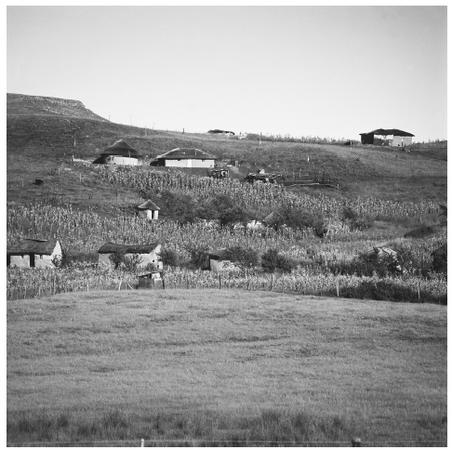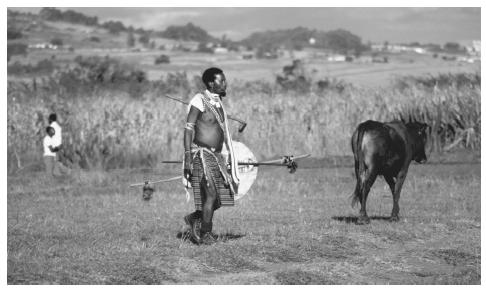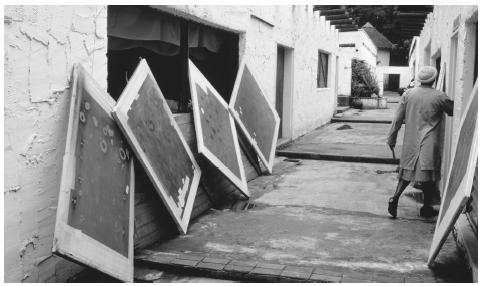Swaziland
Culture Name
Swazi
Alternative Names
Swati, abakwaNgwane
Orientation
Identification. The Swazi nation is named for Mswati II, who became king in 1839. The royal lineage can be traced to a chief named Dlamini; this is still the royal clan name. About three-quarters of the clan groups are Nguni; the remainder are Sotho and Tsonga. These groups have intermarried freely. There are slight differences among Swazi groups, but Swazi identity extends to all those with allegiance to the twin monarchs Ngwenyama "the Lion" (the king) and Ndlovukati "the She-Elephant" (the queen mother).
Location and Geography. Swaziland, in southern Africa between Mozambique and South Africa, is a landlocked country of 6,074 square miles (17,360 square kilometers). The terrain is mostly mountainous with moderately sloping plains. The legislative capital is Lobamba, one of the traditional royal seats. The administrative capital is the nearby city of Mbabane. Manzini is the business hub.
Demography. The population in 2000 is about 980,000. A small European population (about 3 percent) sometimes is called "White Swazi."
Linguistic Affiliation. The official languages are siSwati and English. SiSwati, a Southern Bantu language, is a member of the Nguni subgroup.
Symbolism. The primary national symbol is the monarchy. King Sobhuza II (died 1982) oversaw the transition from colony to protectorate to independent country. The symbolic relationship between the king and his people is evident at the incwala , the most sacred ceremony, which may not be held when there is no king. The full ritual, which takes several weeks, symbolizes the acceptance of traditional rulers, the unity of the state, the agricultural cycle, fertility, and potency.
History and Ethnic Relations
Emergence of the Nation. The Nguni clans, which originated in East Africa in the fifteenth century, moved into southern Mozambique and then into present-day Swaziland; the term abakwaNgwane ("Ngwane's people") is still used as an alternative to emaSwati . Sobhuza I ruled during a period of chaos, resulting from the expansion of the Zulu state under Shaka. Under Sobhuza's leadership, the Nguni and Sotho peoples as well as remnant San groups were integrated into the Swazi nation. "Swazi" eventually was applied to all the peoples who gave allegiance to the Ngwenyama.
National Identity. In the late 1830s, initial contact occurred among the Swazi, the Boers, and the British. A substantial portion of Swazi territory was ceded to the Transvaal Boers, the first of many concessions to European interests. The Pretoria Convention for the Settlement of the Transvaal in 1881 recognized the independence of Swaziland and defined its boundaries. The Ngwenyama was not a signatory, and the Swazi claim that their territory extends in all directions from the present state. More than a million ethnic Swazi reside in South Africa. Britain claimed authority over Swaziland in 1903, and independence was achieved in 1968.
Ethnic Relations. Relations among the Swazi peoples have generally been peaceful. Relations with Europeans historically were strained as a result of land concessions and tension caused by the administrative domination of Great Britain.

Urbanism, Architecture, and the Use of Space
The predominant home style is the Nguni "bee-hive" hut, in which a rounded frame made of poles is covered with thatch bound with plaited ropes. Sotho huts, which have pointed, detachable roofs on walls of mud and wattle, are found throughout the country; these huts have window frames and full doorways. Both types can be found within a single homestead, which may also include European architectural styles. Traditional homestead organization follows the "central cattle pattern." In the center of the homestead is an unroofed, fenced cattle pen, the sibaya , from which women are barred. Residential huts are grouped around the western side. The "great hut," indlunkulu is used as the family shrine, dedicated to the senior patrilineal ancestors. Other huts are occupied by individual wives.
Food and Economy
Food in Daily Life. The traditional food supply fluctuated seasonally. Between winter and the new crops of summer, shortages were common. Maize and millet were the main staples. Dairy products, especially soured milk, were reserved for children. Cattle were slaughtered mainly for ritual purposes, and meat was in short supply. Leafy vegetables, roots, and fruits completed the traditional diet. The introduction of supermarkets means that meat and other products are available throughout the year. The Swazi typically observed a fish taboo, along with a taboo on egg consumption for females and a dairy taboo for wives. There were also clan-specific food taboos on particular birds and wild animals.
Basic Economy. Subsistence agriculture is engaged in by more than half the population. Manufacturing includes a number of agroprocessing factories. Exports of soft drink concentrate, sugar, and wood pulp are sources of hard currency; most of these products go to South Africa. High-grade iron ore deposits were depleted in the 1970s and the demand for asbestos has fallen. Badly overgrazed pasture-land, soil depletion, and drought are persistent problems. Swaziland has an unemployment rate of 22 percent.
Land Tenure and Property. All land was owned and allocated by the king through chiefs and headmen. Land not allocated to individuals remained under the control of the political authority and was reserved for common use, such as for firewood, reed collection, and hunting. Vast tracts of land that were under foreign control at independence have been purchased "for the nation." Sons can inherit from their male kin.
Commercial Activities. The major agricultural products are sugarcane, cotton, maize, tobacco, rice, citrus fruits, pineapples, corn, sorghum, and peanuts.
Trade. Soft drink concentrates, sugar, wood pulp, and cotton yarn are the major export commodities.

Social Stratification
Classes and Castes. There is a sharp social division between rural and urban residents, reflecting the growth of the middle class. Clans are ranked by their relationship to the king and heads of state. The Nkosi Dlamini clan, the royal clan, is the highest, followed by clans traditionally described as "Bearers of Kings" (clans that have provided queen mothers). Among co-wives, the ranking wife is usually determined by clan memberships rather than by order of marriage. Interclan contact is free.
Symbols of Social Stratification. Apart from dress, knowledge of English is the main marker of education and status.
Political Life
Government. The government is a monarchy, with the Ngwenyama functioning as the head of state. The prime minister is appointed by the king. The "Westminster Constitution" of 1968 was suspended by royal decree in 1973. A new constitution was written in 1978 but has not been ratified. A bicameral parliament with a Senate and a House of Assembly has only advisory functions. The judiciary includes a high court and a court of appeals whose judges are appointed. As a result of growing pressure from student and labor groups in late 2000, King Mswati III has promised to introduce democratic reforms.
Leadership and Political Officials. Political parties are illegal, though some operate domestically and in exile. The most important is the People's United Democratic Movement, which calls for a peaceful transition to democracy and abandonment of the advisory system.
Social Problems and Control. The legal system is based on South African law in statutory courts and Swazi traditional law and custom in traditional courts.
Military Activity. The separation of the armed forces and the police is a modern distinction. Traditionally, both functions were performed by regiments in which every man was required to serve. The Umbutfo Swaziland Defense Force and the Royal Swaziland Police are under civilian control.
Gender Roles and Statuses
Division of Labor by Gender. The queen mother serves as a check on the power of the king. In part, the selection of the royal heir is a selection of the next king's mother. Traditionally, men and women cooperated in the agricultural cycle, though only men were responsible for plowing. Women receive gardens from their husbands, but the cultivation of cash crops involves both men and women. Herding is exclusively a male domain. Cattle have important economic and symbolic value. Sex-based stratification characterizes the workforce, though a few women hold important civil service positions.
The Relative Status of Men and Women. The traditional culture was patriarchal. Within the homestead, the only females related by blood to the patriarch were minor children. Their economic value was measured in lobolo (brideprice), usually in the form of cattle. Sons are valued more highly than daughters. Human rights groups have cited legal and cultural discrimination against women and abuse of children as social problems.
Marriage, Family, and Kinship
Marriage. Marriage is defined as the union of two families. Polygynous marriages were once common, but the spread of Christianity and economic considerations have made them much less common today. The production of children is seen as an essential part of the marriage contract. Marriage between members of the same clan is forbidden; this practice extends and maintains social ties. Subclans occasionally are created to facilitate marriage between members of the same clan. Divorce has increased as a result of urbanization. Since traditional marriage is governed by uncodified law and custom, women's rights are interpreted differently by different parties. Under civil law, a man is technically restricted to a single wife.
Domestic Unit. In rural areas, patrilocal residence traditionally was the norm, and a homestead would include the headman, his wives, unmarried siblings, and married sons with their wives and children. With the exception of minor children, all females within the homestead are considered "outsiders." Nuclear family residence is the norm in towns.
Inheritance. Only males can inherit. The heir usually is not appointed until the father's death. In traditional polygynous households, the main heir is rarely the oldest son. The rank of the mother, not the order of marriage, plays an important role in the selection of the main heir.
Kin Groups. The clan is the major kin group. Every Swazi bears the clan name of the father, which also serves as a surname. Women retain membership in their paternal clan, though it is common for wives to use the husband's clan name as a surname. Each clan contains a number of lineages.
Socialization
Infant Care. Traditionally, infants were not recognized as "persons" until the third month of life. Before that age they were described as "things," had no names, and could not be touched by men. After the achievement of personhood, a child remained closely attached to the mother. It was carried in a sling on her back and fed upon demand. Weaning occurred between two and three years of age.
Child Rearing and Education. A child began to associate with peers at age three. The mother left the

Almost all children receive primary education today, although there is a significant dropout rate before age thirteen. Only about half the children of secondary school age attend school. Agricultural activities are a national priority, and relevant subjects are taught at many secondary schools.
Higher Education. Several institutions provide technical, commercial, and vocational training. About three thousand students are enrolled at the University of Swaziland (UNISWA), which has three campuses. UNISWA has established a program of distance learning. Students seeking a postgraduate education often enroll in South Africa.
Etiquette
Respect is due to one's elders. Traditionally, greeting all persons, including strangers, was a normal event; this is no longer the case in towns.
Religion
Religious Beliefs. Christianity is the predominant religion. In addition to the traditional Western forms, there are numerous syncretist churches, and indigenous beliefs about the supernatural, particularly regarding ancestors, are still important. Many people consult tinyanga (traditional healers), who employ natural medicine and ritual in their cures. There is a widespread belief in witchcraft and sorcery. " Muti (medicine) murders" in which persons are killed so that their body parts can be used for medicine are now uncommon.
Religious Practitioners. Traditional religion has no class of ordained priests. The senior male in each family maintains communication with the ancestors. Diviners known as tangoma are considered more powerful than healers and are often possessed by spirits. Traditional healers are typically male.

Rituals and Holy Places. The incwala is the major sacred ritual. Certain parts of the homestead are ritually protected; the royal burial sites in the southern mountains are considered sacred.
Death and the Afterlife. Swazi believe that the spirit of a person has a distinct existence. One's social place is demonstrated through the elaborateness of funeral rituals. A head of household is buried at the sibaya ; his widow shaves her head and undertakes a long period of mourning.
Medicine and Health Care
Western medical care is available throughout the country. Many individuals seek treatment from both Western and indigenous practitioners. There is an extensive AIDS education campaign.
Secular Celebrations
The king's birthday is celebrated on 19 April, National Flag Day on 25 April, and Independence Day (Somhlolo Day) on 6 September.
The Arts and Humanities
Literature. Oral literature continues to flourish, and there is a small body of written literature in siSwati.
State of the Physical and Social Sciences
Little advanced work is done in the sciences, although several scientists work at UNISWA, which has established a research center.
Bibliography
Booth, Alan R. Swaziland: Tradition and Change in a Southern African Kingdom , 1983.
De Vletter, Fion, ed. The Swazi Rural Homestead , 1983.
Hall, James. Sangoma: My Odyssey into the Spirit World of Africa , 1994.
Harrison, David. "Tradition, Modernity and Tourism in Swaziland." In David Harrison, ed., Tourism and the Less Developed Countries , 1992.
Kasenene, Peter. Religion in Swaziland , 1992.
Kuper, Hilda. An African Aristocracy: Rank among the Swazi , 1947.
——. The Swazi: A South African Kingdom , 2nd ed., 1986.
Marwick, Brian A. The Swazi , 1940.
Matsebula, J. S. M. A History of Swaziland , 1987.
McFadden, Patricia. "The Condition of Women in Southern Africa: Challenges for the 1990s." Southern African Political and Economic Monthly 3 (10): 3–9, 1990.
Nyeko, Balam. Swaziland , 1994.
Rose, Laurel L. The Politics of Harmony: Land Dispute Strategies in Swaziland , 1992.
Simelane, Nomthetho G., ed. Social Transformation: The Swaziland Case , 1995.
—R OBERT K. H ERBERT
i would realy appriciate it
Kind Regards
Mtfombeni
that im a fully swazi
Thanks
Thanks for creating such a website which allows some of us to learn about ohter people cultures,tradition and lifestyles.
Richard Ali
Vanimo
Papua New Guinea
Thanking you in advance.
Vusi
I'm from Sri Lanka
thank you
Thabisile Simelane
Im keen to know more about the Dlamini clan and also thankful for this useful information. .. Thank you for giving me a kick start. ...♡♡♡
All am aware of is that women are the family managers under the directorship of the men who are their Husbands. They have the nurturing nature for both girls and boys but mainly their focus is on the girls but not totally ignoring the boys. The women is like the ant (very sensitive on the times and seasons); makes sure that family is provided for with or without the involvement of men. That is why many families stay intact even after the men pass on.
so I would understand where do I originate from and get to understand more about my swati culture.
we are humans too